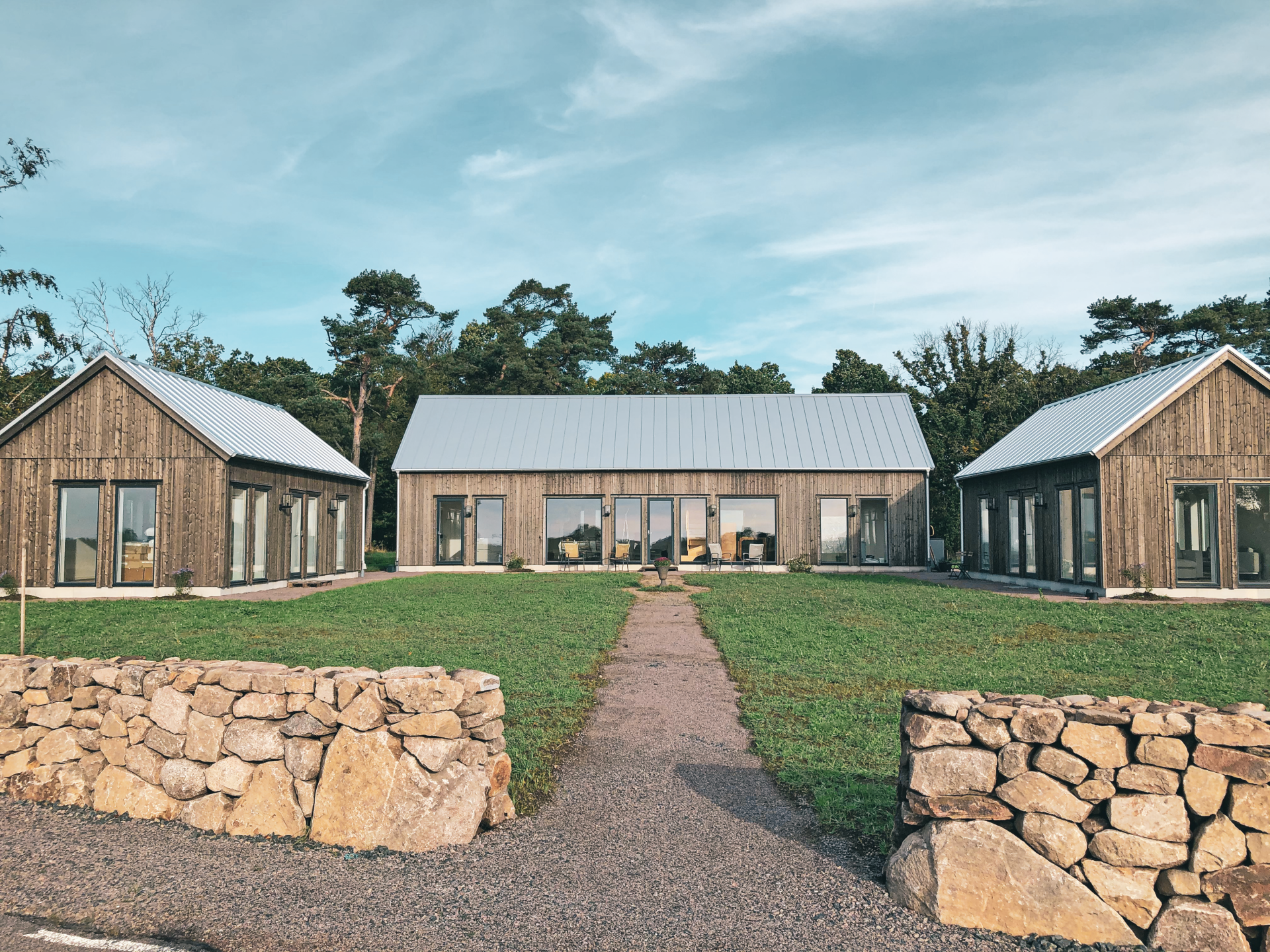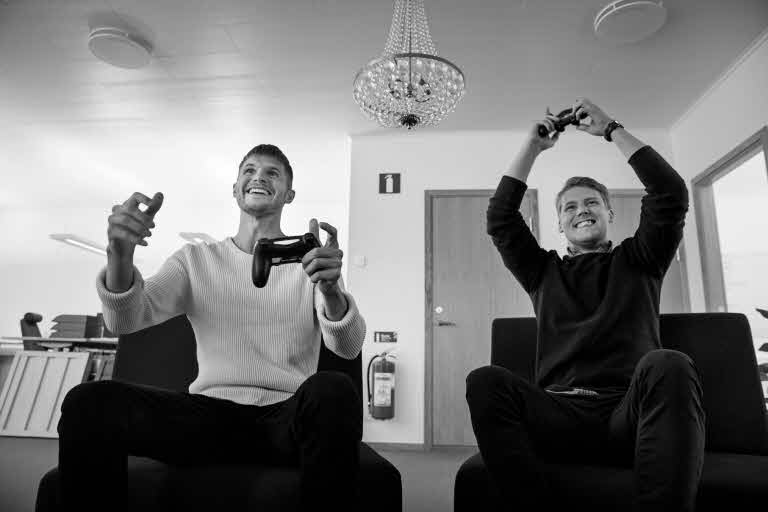
- MEDIA
- PLAYFUL CONSTRUCTION TAKEN VERY SERIOUSLY
Playful construction taken very seriously
- Article
- Wood products
Lundqvist Trävaru in Piteå, Sweden, is making it easier for ordinary people to build things made from wood by using system that’s reminiscent of Lego and digital design solutions inspired by computer games. That may sound playful, but the owners’ objective is to revolutionise the construction industry – and they take it very seriously.
A modern production plant near the harbour in Piteå, a long way north on the east coast of Sweden, is home to a construction company that’s almost 90 years old. Lundqvist Trävaru AB was established in 1936, manufacturing furniture for the Swedish Armed Forces. Customers nowadays can directly design their own building in 3D on the Lundqvist website and get a price for the kit and assembly straight away. The system automatically creates shopping lists, transport bookings and drawings for applications for planning permission, too. The company has a turnover of SEK 240 million, employs 60 people and is anything but traditional in its approach these days. Owners Jens Lundqvist, Deputy CEO, and Samuel Holmström, CEO, have been working since 2014 on realizing their shared vision of smarter, more flexible, more fun ways of building using wood – by taking the world of computer games they grew up with and incorporating it into the business.
“As far as I’m concerned, it all began because the slowness of many of the processes in the industry and the fact I couldn’t spend as long as I wanted on the right things when I started working in construction really wound me up. I was cutting and pasting numbers from one program to another, and customer had to wait an age for a price. That was when I started to form an idea of how an ideal system could work,” says Samuel.
Construction kit simlar to Lego
Lundqvist is now at the digital cutting edge of development thanks to the construction system developed by Jan Lundqvist, Jens’ father. He got his idea from Lego bricks, which can be combined in almost endless configurations. Following a devastating fire that destroyed all of the company’s assets in 2004, he made the crucial decision to invest fully in the kits on a profit and loss basis. The Internet achieved a major breakthrough soon after, and the timing of that meant the kits could soon be delivered all over Sweden. This new focus sparked his son’s interest in taking over the family business one day. At around the same time, Samuel Holmström – who’s about the same age as Jens – was looking for a new career path when his plans to study computer engineering at university were dashed when he failed to gain the grade he needed in maths.
“There was a misunderstanding that I’m sure we could have resolved, but that said I was keen on a job ad from this small, exciting company by the name of Lundqvist that said its construction system was similar to Lego,” says Samuel.

turbulent. That’s helped us a lot,” says CEO Samuel Holmström
Game developers - the key to sucess
He then became the first person to be taken on by the company in 2010, and he soon realized how much fun could be had testing ideas and seeing their impact quickly – a major positive of smaller companies. He and Jens were quick to contact Luleå University of Technology when they took over as majority owners. As part of a degree project, they worked together with computer game designers, computer game developers and systems scientists to create a prototype of the system that’s now used on the website to design holiday homes, garages, machine shops, stables and other structures.
“One of the first people we took on together was a game developer who’d been involved in the project,” says Samuel.
More digital developers have been recruited since then and, of the 60-strong workforce, only four currently have a background in traditional construction.
“One unexpected effect of our focus on digital development is that as our digital systems have improved, the threshold for working with us has lowered. You don’t have to be a construction engineer to do everything, which has given us the advantage of being able to focus more on people than on their actual skills when we’re recruiting,” says Samuel.

That’s why the company isn’t at all worried out labour shortages. The recruitment base is broad, which also provides plenty of scope in-house.
“Diversity is incredibly powerful as long as our values and our vision of where we’re heading can act as a unifying force. We have such a clear focus on innovation, and so the diversity of perspectives and approaches is extremely rewarding,” he says.
Minimising waste
Social sustainability is important to the company, which also has a tried and tested economically sustainable business offering good growth and profitability over time. Interestingly, Lundqvist’s digital system for drawings and standardized construction systems account for the greatest impact in terms of environmental sustainability.
“The second our customers buy something, we know exactly what materials we need. We don’t need to manufactured anything against inventory. So our digital information flows have enabled us to reduce our waste by up to 20–40 per cent compared to traditional manufacturing, depending on what material we’re working with,” says Samuel.
While Lundqvists' is happy to offer inspiration to colleagues in the industry, he’s also keen to maintain his digital edge by always continuing his journey, which to date has involved thousands of tiny development steps. Everything that happens behind the interface – i.e. what customers see on the screen – has to be streamlined. And they’re continuing to network with talented partners so that future opportunities can be captured all over the country.
“I reckon we have a new generation of consumers here in Sweden where the vast majority of people have grown up playing the same games as us. They know what Sims are, and using the systems we offer comes naturally to them,” says Samuel Holmström.
Foreign markets enticing
Different business models are also being trialled in foreign markets such as Norway, New Zealand and the US.
“The US is the most exciting market in the long term. Not only is it enormous, but we can’t see anyone else doing exactly what we do over there. ”Companies focusing on similar areas are offering very simple buildings, so it’s a real thrill to take a leading position there,” says Samuel.
And when Lundqvist stick their necks out and say they want to revolutionise the construction market, it’s not just talk. They do have a specific aim in mind.
“We can safely say we’ve actually revolutionised the industry when we’ve made it possible for private individuals to click on a website and get a turnkey house delivered to them that they’ve designed for themselves online. And that day really isn’t far off,” says Samuel.
Text: Jennie Zetterqvist